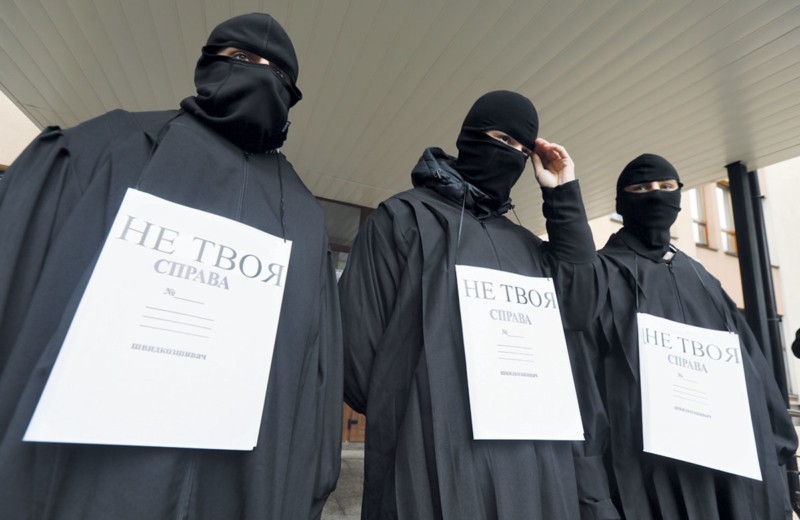Ukraine’s judicial reform has collapsed, members of Public Integrity Council, the judiciary’s civil society watchdog, said at a news briefing on Nov. 6.
They said that the council’s negotiations on reaching an accommodation with the High Qualification Commission of Judges, one of the judiciary’s governing bodies, had failed.
The commission did not respond to a request for comment. Previously it denied claims that it was sabotaging judicial reform.
In March the Public Integrity Council suspended its participation in the commission’s qualification assessment, or vetting, of incumbent judges, saying new High Qualification Commission regulations had effectively blocked the council’s work.
Under the law, the qualification assessment of judges was to have reformed the judiciary through the firing of corrupt, dishonest and incompetent judges.
Subsequently, the Public Integrity Council and the High Qualification Commission started negotiations on resuming cooperation. In September the Supreme Court sided with the Public Integrity Council and recognized the High Qualification Commission’s new regulations as unlawful.
“Judicial reform has failed,” Public Integrity Council member Natali Sokolenko said at the briefing. “Ukrainian budget money and funds allocated by our foreign partners have been spent in vain.”
She said that the High Qualification Commission had “completely derailed the judicial reform” and the commission should be held responsible.
Sokolenko and Public Integrity Council coordinator Vitaly Tytytch said that since the Public Integrity Council’s work had been ignored and sabotaged by the authorities, the only way to ensure there was proper judicial reform would be to add civil society representatives to the High Qualification Commission and replace the current commission.
Tytych also said he was resigning as a member of the council because the authorities had ignored, blocked and sabotaged its work.
See related stories here, here and here.
Negotiations
Tytych said that the High Qualification Commission had not accepted a single proposal made by the Public Integrity Council.
Moreover, the High Qualification Commission refused to even discuss two out of the Public Integrity Council’s conditions for returning to the qualification assessment process – those related to transparency and conflicts of interest, he added.
Tytych said that in September Andriy Vasylenko and Andriy Kozlov from the High Qualification Commission and representatives of the Public Integrity Council had reached preliminarily agreement on approving the criteria for assessing judges and adopting changes to the commission’s regulations.
In October Vasylenko sent the Public Integrity Council draft criteria for assessing judges and draft regulations, Tytych said.
However, these documents differed from those created jointly by the commission and the council during the mediation process, he said. Moreover, it turned out that the High Qualification Commission had not approved the content of these documents, and it was just Vasylenko’s personal view, he added.
Tytych also said that during the qualification assessment of judges, the High Qualification Commission had repeatedly violated the assessment criteria that it had negotiated with the Public Integrity Council.
The commission gave the green light to numerous judges who passed unlawful rulings against protesters, as well as those with violations in their asset declarations and those who violated human rights, he said.
Supreme Court ruling
In September the Supreme Court annulled the High Qualification Commission regulations that effectively blocked the work of the Public Integrity Council, declaring them unlawful.
The council argued that these regulations are unlawful because no law gives the High Qualification Commission the right to set regulations for the Public Integrity Council.
However, the High Qualification Commission has so far failed to comply with the court ruling and change its regulations.
The new regulations seek to block the Public Integrity Council from assessing the integrity of judges unless there is a ruling by the High Council of Justice, the National Agency for Preventing Corruption, the Council of Judges or the State Fiscal Service.
The regulations stem from confusion between the criminal prosecution of judges or disciplinary penalties on the one hand, and the assessment of judges’ professional ethics and integrity on the other hand, Tytych said.
Under the law on the judiciary and status of judges, the Public Integrity Council’s role is to not to assess whether a judge has committed a crime or a disciplinary violation, but to assess whether judges meet integrity and professional ethics criteria according to international practice, he added.
Under another new regulation, any decision of the Public Integrity Council must be signed by all of its members.
The council said that this requirement would delay or block most of its decisions.



